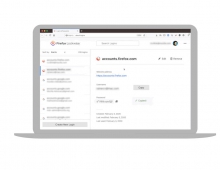
Mozilla Policy Targets Web Trackers, Supercookies
The Mozilla Foundation plans to reduce the ability of websites and other online services to track users of its Firefox browser around the internet.
In support of its decision in late 2018 to reduce the amount of tracking it permits, the organisation has now published a tracking policy to tell people what it will block.
Web tracking techniques allow users to be followed and profiled around the web. Facebook planting trackers wherever a site has a "Like" button is a good example. A user without a Facebook account can still be tracked as a unique individual as they visit different news sites.
Mozilla's security policy said these "stateful identifiers are often used by third parties to associate browsing across multiple websites with the same user and to build profiles of those users, in violation of the user's expectation".
Some sites "decorate" URLs with user identifiers to make the user identity available to other websites. Firefox isn't yet ready to block that kind of behaviour, but Mozilla said that "we may apply additional restrictions to the third parties engaged in this type of tracking in future."
Sites will be able to use URL parameters for activities such as advertisement conversion tracking, the policy said, so long as that isn't abused to identify individuals.
Mozilla has also flagged browser fingerprinting and supercookies for future removal.





















